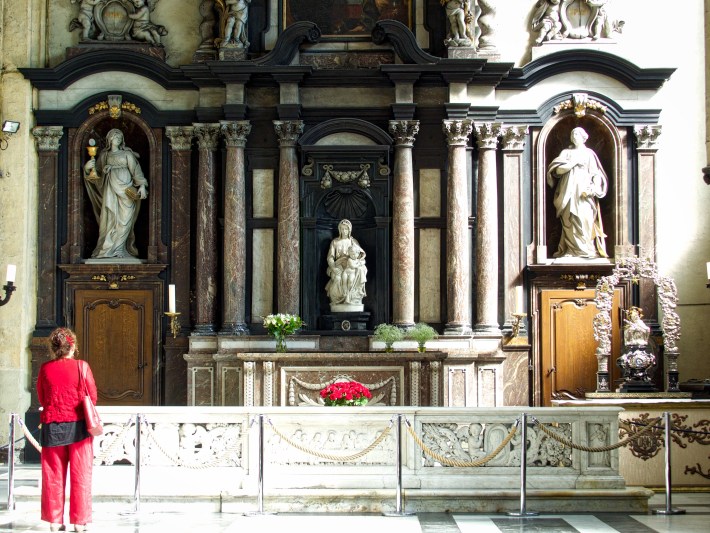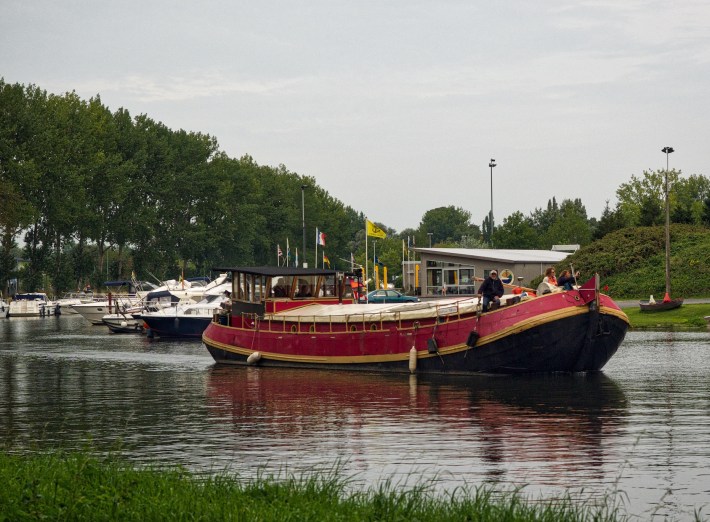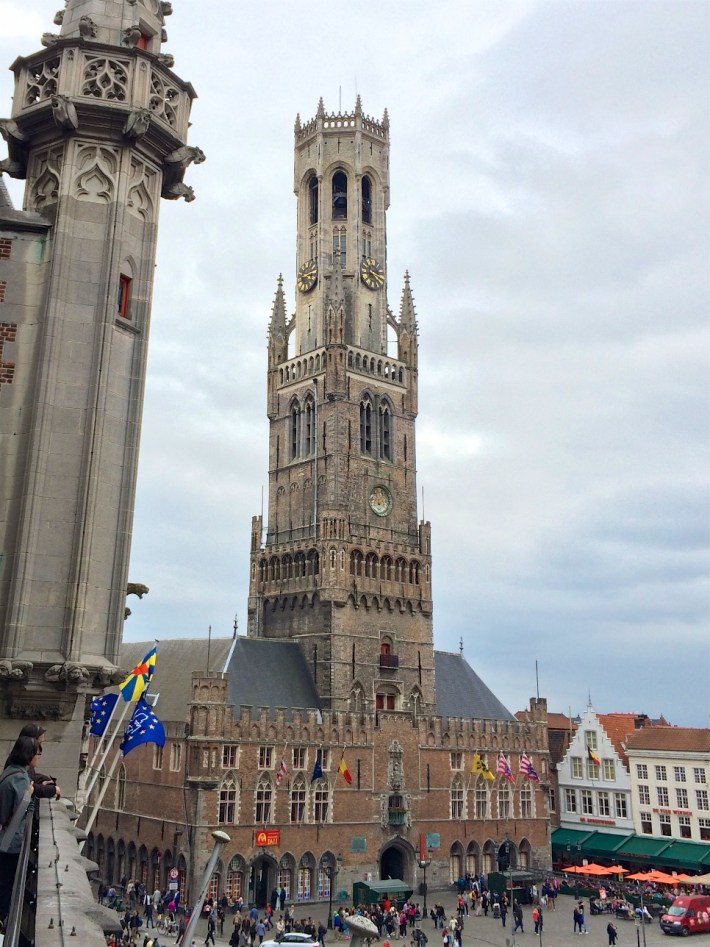Bruges/Brugge?
It’s so difficult to get the names right in Belgium. Most places have three names we have to consider: the Dutch/Flemish, the French/Wallonian and the English. So we have, variously, Ghent (En), Gent (Du) and Gand (Fr). Fortunately, the English and the French both refer to Bruges, but the Flemish/Dutch where the city is located use Brugge. So let’s go native.
During the ‘Golden Age’ from the 12th to 15th century, Brugge was arguably the wealthiest city in the Low countries, thriving on a sea trade in goods and spices and wool and cloth. Silting of the channel that allowed traders to reach the outlying ports of Brugge eventually led to its decline and the rise of Antwerp. A canal connecting Zeebrugge and Brugge roughly follows this old sea lane.
Beer
If any city could establish Belgium’s pre-eminence as the world’s best destination for beer drinkers, it would probably be Brugge. Forget chocolate, forget lace – beer!
We were delighted to come across the Beer Wall paying homage to more than 1,000 beers – well short of the total number of Belgian beers from which you can sample – and it is expected that in 2016, the wall will be updated to showcase more than 1,600 beers. For every beer there is an associated beer glass – they come in many different shapes and sizes, and are all wonderfully decorated with the appropriate logo. Thereby magnifying the joy one would normally get from just drinking Belgium’s fabulous beers.



While perhaps an extreme example of the significance of beer in Belgium, even in our short stay in the country and in Brugge we were delighted with the taste, variety and wonderful locations where we could consume the beer. It even had the effect of (slightly) reducing our consumption of wine!
Chocolate
I’m not sure if Brugge is the world capital of chocolate – but it must come close. In the old city, it seems one in four of the shops is related to chocolate, most simply selling vast amounts of it in forms ranging from the basic block to the highly decorative creations. It’s expensive but a delight to the eyes – there is apparently no end to the creativity of the chocolatier – and to the taste buds, so well worth a treat.


Churches
Of course! Well only one this time and it was mostly because we kept leaving our bikes next to this one. The Church of Our Lady features the Madonna of Brugge. Sculpted by Michelangelo it was the only one of his works to leave Italy during his lifetime. Stolen from Brugge by Napoleon and later by the Nazis, it now resides behind bullet proof glass after an attack in 1972. The detail and flow are wonderful, what that man could do with stone!


More churches next time!
Canals
As part of its trading history and being a city of the lowlands, Brugge is threaded through with canals. Entry into the city canals is restricted and they are far too small for Catharina anyway. A boat ride through the canal is a tourist ‘must’ and there are plenty of operators.

The cruise through the town was not expensive, there was a good english commentary and there was a relaxed pace. It gives you a quite different perspective to Brugge.

New Friends
As we travel more, we make and meet more cruising friends. Lisette is a member of a facebook group entitled ‘Women on Barges’ (WOBs). Like-minded women gathering to chat about all aspects of living on board. So, she was thrilled that arriving in Brugge put us astern of the originator of the group, Carole, on board her and husband Barry’s barge Silk Purse. Fellows from the Commonwealth, these Canadians had recently crossed the Channel and were getting in some of Belgium before the winter. Had a lovely catch-up with them and four guests they were hosting on board before they had to leave.

The Old Town
Still restricted in the amount of time we could spend, we didn’t get to see as much of the historic part of Brugge as we wanted, but this will not be the last time we visit this beautiful city. There was, however, a very good historical exhibition ‘Historium Brugge‘ situated in the neo-gothic Provincial Court, a building next to the Belfry in the market square that, through a variety of displays, illustrated the lifestyle of mediaeval times.
The building has replaced the ancient Waterhalle, an undercover port that was unique in the world in it time, which stretched from the 13th century until 1789 when it was destroyed by fire. It allowed vessels to cruise from the sea ports outside Brugge, right into the heart of the city, where their cargo could be unloaded undercover.

There was a very interesting special exhibition adjoining the main building, where you could take a seat in a little booth, put on a virtual reality headset and treated to a very immersive animated experience of leaving a seaport and cruising down into the Waterhalle.
The main exhibition covered the history and culture of Brugge from its founding to the modern day – extremely well done, and quite captivating with high-tech, animated features that came alive as we entered each of the rooms. Once we had walked through the entire performance, there was a substantial static display that expanded on the scenes we had just witnessed with additional historical information.
From this gallery, you could go outside onto a balcony that allowed a spectacular view of the Grote Markt, where a brass band was performing a concert, and across the square to the Belfry.
Sadly it was too late for us to climb the Belfry this time – a treat in waiting for our next visit! Many of the colourful ‘Guild Houses’ frame the remaining sides of the square.




So although we were unable to access the belfry, we were treated to an impromptu concert just below in the entrance. I’m embarrassed to say we had to ask what the large stringed instrument was and were told, rather curtly, that it was a balalaika. The music was great – a very novel combination of performers, playing some well known Mozart pieces.

In a room upstairs, there was a children’s interactive art project, where they are building their idea of what Brugge should look like. Surely great fun to construct and a very colourful result that you could carefully walk through.

We cycled back (the harbour where we were moored – Flandria – is just a little out of town and a bit of a walk, so we always travelled into town on the bikes) through the picturesque gardens that adjoined the harbour.



We were reluctant to leave Brugge, but resolved to visit again next year.
